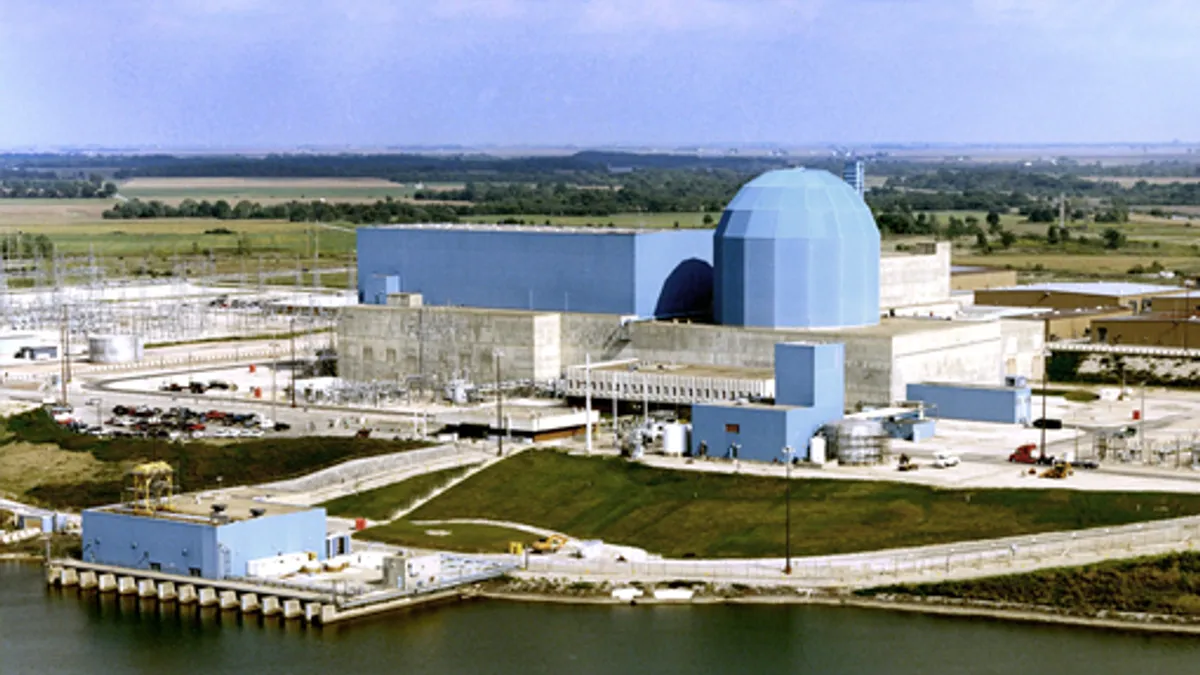Dive Brief:
-
A federal appeals court on Thursday upheld nuclear energy subsidies put in place by Illinois, ruling they do not interfere with the federal government's jurisdiction over interstate power markets.
-
The U.S. Court of Appeals for the 7th Circuit ruled that the Illinois Zero Emission Credit (ZEC) program does not overstep the state's authority because it does not require power plants to participate in interstate power markets, a precedent established in the 2016 Supreme Court case, Hughes v. Talen Energy. A similar court case is pending in New York.
-
The Federal Energy Regulatory Commission (FERC) and Department of Justice (DOJ) filed a brief supporting the state programs this spring, and the court decision hews close to their arguments. Coal and gas generators who challenged the ruling say they will now push FERC to mitigate the market impacts of the subsidies in ongoing capacity market reforms.
Dive Insight:
The 7th Circuit's Thursday decision is a blow for fossil fuel generators and adds to a growing body of case law on the boundary between state and federal jurisdiction in the power sector.
Under the Federal Power Act, states have control over their generation mixes, while the federal government regulates interstate power markets through FERC.
In this case, fossil generators argued the Illinois program overstepped that boundary by allowing nuclear plants to stay online and enter bids in the PJM capacity market, lowering the price from what it would have been if the plants retired.
The 7th Circuit judges dismissed that argument, saying that a state policy only infringes on federal jurisdiction if it mandates that plants participate in interstate markets.
"To receive a [zero emission] credit, a firm must generate power, but how it sells that power is up to it. It can sell the power in an interstate auction but need not do so," Judge Frank Easterbrook, a nominee of President Ronald Reagan, wrote for the court. "But because states retain authority over power generation, a state policy that affects [wholesale market] price only by increasing the quantity of power available for sale is not preempted by federal law."
That justification comes directly from the Supreme Court's Hughes decision, which invalidated a Maryland generation program that made subsidies contingent on participation in the PJM capacity market. In that case, a unanimous Supreme Court said that state policies "untethered" to the wholesale power market should still be permitted under the Federal Power Act.
The 7th Circuit decision is the second time a federal appellate court has interpreted the Hughes ruling, and Easterbrook invoked it directly, saying it "draws a line between state laws whose effect depends on a utility's participation in an interstate auction (forbidden) and state laws that do not so depend but that may affect auctions (allowed)."
Easterbrook was joined in the decision by Judge Michael Reagan and Judge Diane Sykes, appointed by former President Bill Clinton and former President George W. Bush, respectively.
Along with the 2nd Circuit Court's decision in Allco v. Klee last year, energy lawyers say the Thursday ruling shows that courts are interpreting the Hughes decision narrowly.
"So long as a state does not require a generator to clear an RTO auction, the program is safe under Hughes," Ari Peskoe, director of the Electricity Law Initiative at Harvard Law, tweeted on Thursday.
The court's decision also references a brief filed by FERC and DOJ in support of the Illinois program. There, the federal agencies said that if the subsidies disrupt market operations, "the solution lies with the Commission, not the courts."
Easterbrook agreed with that interpretation, saying market impacts of ZECs "do not lead to preemption; they are instead an inevitable consequence of a system in which power is shared between state and national governments."
FERC ordered the PJM Interconnection — where the Illinois plants are located — to reshape its capacity market this summer, and Easterbrook said that proceeding is the proper place to address ZEC market impacts.
"Once the Commission reaches a final decision in the ongoing proceeding, the adequacy of its adjustments will be subject to judicial review," he wrote. "The need to make adjustments in light of states' exercise of their lawful powers does not diminish the scope of those powers."
Fossil generators that challenged the ZEC program in court say they will focus on pushing FERC to diminish the market impacts of the subsidies.
"Today's decision confirms that state subsidy programs such as nuclear bailout ZECs can harm wholesale markets," The Electric Power Supply Association, a generator trade group, said via email. "FERC told the 7th Circuit the commission can mitigate these negative effects and today's opinion relies on that representation. EPSA now expects FERC to act promptly in the pending PJM capacity market docket to prevent the acknowledged harms state ZEC programs inflict on federally-regulated wholesale power markets."
EPSA did not rule out challenging the 7th Circuit’s decision at the Supreme Court, but analysts have warned that could be a heavy lift for the trade group. After FERC filed its brief supporting the ZECs, analysts at ClearView Energy Partners, a research firm, told their clients that any high court challenge has "low odds of success given FERC's position that it has sufficient jurisdiction to address the issues raised."
The 7th Circuit's ruling also bodes well for a similar ZEC program in New York, put in place the year before the Illinois policy. The 2nd Circuit Court, which is hearing the case, previously said it was not likely to rule until after the 7th Circuit, and ClearView analysts expect "read through to the New York case to be very strong."














